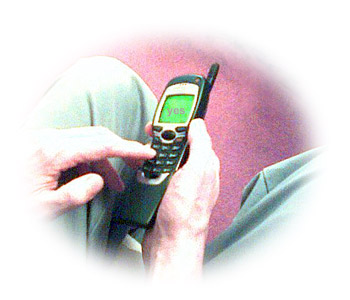A Cambridge perspective
on the digital world



September 2002
The dramatic growth of text messaging over the past three years demonstrates the power of text – for almost any purpose.
We are familiar with the use of text for teenage rendezvous and (courtesy of Vodafone) for adult flirting. More recently we have seen text used for World Cup prediction games and big Brother evictions - events in which millions participated. The vote arranged by our sister company mTank and partner Payco UK for Granada TV demonstrates that text has a serious side, too.
 Granada
TV set up a debate on the topical issue of capital punishment, following the
tragic murders of Holly Wells and Jessica Chapman. Text messaging provided
a way for those watching not only to hear the views of others, but to express
their own, instantly.
Granada
TV set up a debate on the topical issue of capital punishment, following the
tragic murders of Holly Wells and Jessica Chapman. Text messaging provided
a way for those watching not only to hear the views of others, but to express
their own, instantly.
Thousands of viewers sent YES/NO votes in response to a 15 second announcement on the Granada Reports news programme. But interestingly, many were sufficiently moved to add additional comments and views. Watching the results come in, we were surprised to see how much can be expressed in just 160 characters - the limit of a text message - and with how much force. The passion and emotion of many of the responses simply leapt off the screen.
We believe this is the first time text messaging has been used for an opinion poll on a serious political issue, linked to a media debate. We do not think it will be the last. The combination of TV, a broadcast mass medium - and text - an interactive mass medium - is hugely powerful as a means of engaging and involving people. It may even prove to be a new form of democratic expression.
We cannot think of any other way that the individual and collective opinions of a large group can be expressed so quickly and so completely. The vote was one of the first uses of mTank's intxt™ interactive text response system for media, which allows all of the responses to be viewed and analysed on screen as they come in. By comparison a telephone vote can do no more than give a numerical result. intxt™ showed, in graphic detail, the feelings behind the voting. In a studio situation, individual responses can be singled out for further exploration, by phone or text.
Some viewers - completely unbidden - went so far as to give their names and addresses. One 64 year old woman, who texted in asking to be called back, said that it was the first time she had responded to a television programme of any kind. Since the debate programme was recorded and transmitted late at night, she had tried calling the studio without success. But text gave her a chance, for the first time, to express an opinion and receive a response.
From what we have seen, we believe that interactive text will become a permanent feature of the media landscape. So far, we have only scratched the surface of what is possible. As well as adding instant response and interactivity to any existing programme, text enables entirely new programme formats, that go way beyond the simple interactive voting we see today.
Among other things, text is clearly ideal for collecting opinions on issues debated on TV, radio, in newspapers and magazines, or even on the Internet. Engage in the debate, listen to others, and participate as much as you want to. When you’re ready to express your opinion, text it. It can be in front of those in the studio, or on the screen to millions, in seconds.
